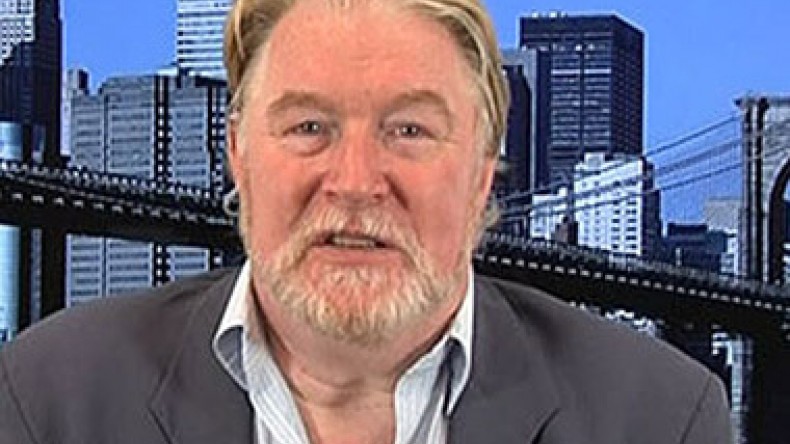
European economy running on delusional ideas - Ian Williams
Press TV has conducted an interview with Ian Williams, Foreign Policy in Focus from New York, about the issue of eurozone economies struggling to cope with their worsening debt crisis. The following is an approximate transcript of the interview.
- Looking at a typical month for the eurozone we have Greek labor unions right now in massive protests outside parliament on a vote taking place there that’s going to entail most likely from 12,000 to up to 30,000 job cuts, expected to happen towards to the end of the year.
Not to mention France downgraded from AAA to AA. Even the blocs first rescue fund, the European Financial Stability Facility - they were even downgraded by Fitch.
Portugal’s high profile resignations - the foreign minister and finance ministers - and that’s just a typical month it appears to be in the eurozone.
When you look at the eurozone after all these years, where do you see it going? What’s your take on the whole situation regarding the crisis that it’s finding itself in?
- Like most of the modern economy it’s running on illusions.
The whole idea that anybody is ever going to pay back all of these debts is completely illusionary. The fact that British banks are worth 2 or 3 times as much as Britain; that Iceland had those huge overhangs....
We’ve almost completely lost structure of the idea that an economy is actually people making and selling goods and services to each other.
This sort of cotton candy money that they’ve been spinning up and then lending is fundamentally always going to come to a crisis.
In the case of Europe, the debts that they have run up are not that terrific frankly; but it’s all about confidence and confidence is a magic word.
The fact that the rating agencies, which as many people on your show over the years have pointed out, are themselves deeply flawed - the fact that we’re relying upon their judgment about Greece and Portugal is almost laughable.
The fact that people want to buy Portuguese and Greek debt because it pays higher interest rates than let’s say US treasuries is sort of interesting, but that increased interest is supposed to repay them for the risk - but there is no risk because the predominant neo-Liberal idea seems to be that despite all of the moral hazards of debts, bankers never pay the bills.
Customers have to pay the bills like in the United States where students have to pay loans even if they go bankrupt; where there’s no relief on a mortgage if somebody goes bankrupt. But the banks can just walk away.
The shareholders and the bond-holders tend to get paid before the actual people out there who borrow the money. And on top of all this the banks aren’t lending money.
The system is fundamentally flawed and nobody is actually sitting down to think of a root and branch way.... We’re going to have to be a Marxist, but we need a John Maynard Keynes who can come and actually say well this is one way to get things kick-started again.
- I’d like to break down what is called the quantitative easing not to get too much into the technicality behind, but we’re going to get into it a little bit.
Since this crisis started you have the Bank of England and also the Federal Reserve that has pumped money into its economy. We’re looking at for example the quantitative easing of the United States, 40 billion dollars a month for 2012; 80 billion for 2013 set to go through the year.
This is supposed to create some kind of financial health, economic health, but it’s not doping that. Based on some accounts 40 billion dollars per month for example would amount to 9,600,000 jobs paying 50,000 per year. But it’s not doing that - where is this money going?
Are the banks holding on to it? - Which of course derides the question of why aren’t they lending it out?
- It is now established dogma that you can’t allow governments to spend. So the governments are printing this money, giving it to the banks and hoping that the banks will put it into productive loans and uses.
The full Keynesian approach, which I tend to approve, would be that the government itself would spend that money. It wouldn’t give it to the banks, it would invest in public works, it would invest in bridges and roads and schools, it would invest in hospitals, it would invest in infrastructure.
It would even hire people. If you remember Keynes’ famous phrase was “Bury the dollar bills and pay people to dig them up.” That actually gets money into it.
But what’s happening is that the money is being lent to banks which then use it to play with financial instruments of one kind or another and try to make money out of the arbitrage on the interest rates.
They’re getting money for next to nothing, they’re then lending it to some consumers at exorbitant interest rates and the government under the notion of not interfering with private enterprise isn’t taking it.
So even though the government almost own the banks and rescued them, they’re too scared to actually tell the banks what to do.
As your previous speaker said, the banks think that they’ve got the government as a hostage and the government thinks they’re a hostage.
In fact of course they could turn around and say hey we’re taking you over, you don’t have enough liquidity; we are going to run you from now on and we will make you spend. But that would go against every notion of neo-Liberalism.
The government running banks? The government can pay for banks; the government can finance banks; it can lend them money indefinitely. But it can’t run them, it’s the law.
Newsfeed
Videos






























